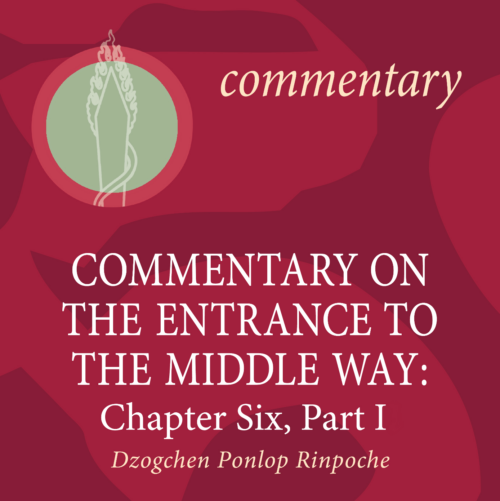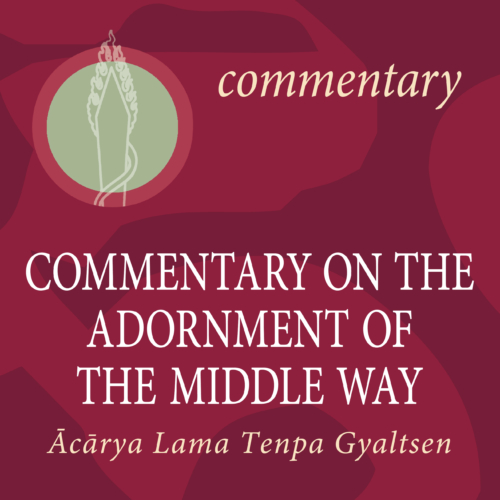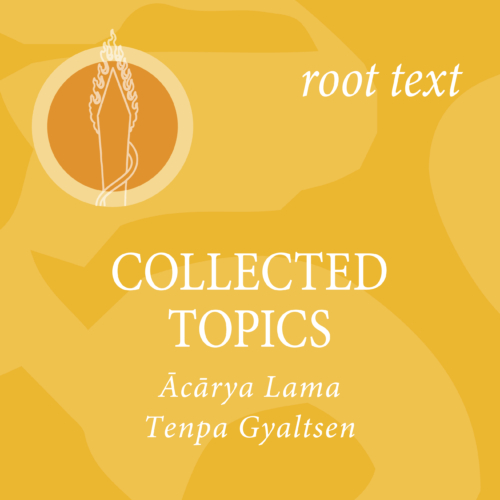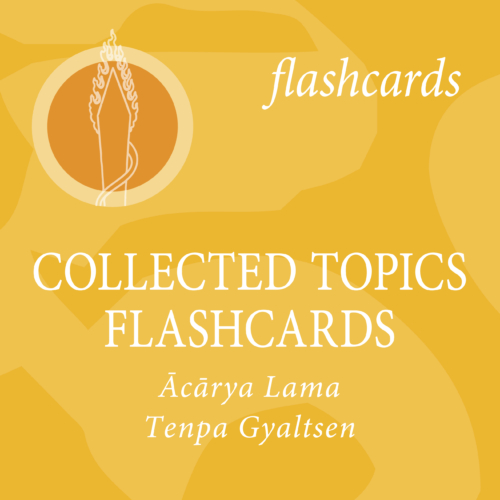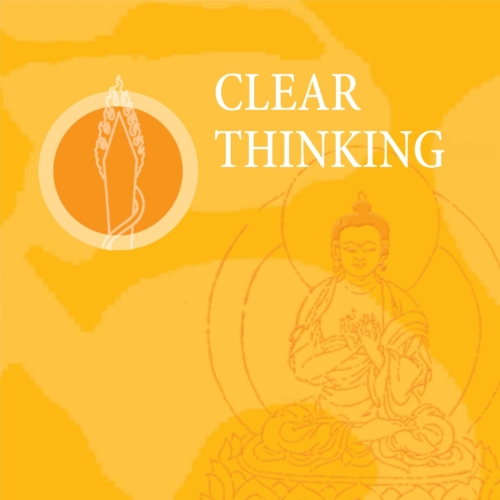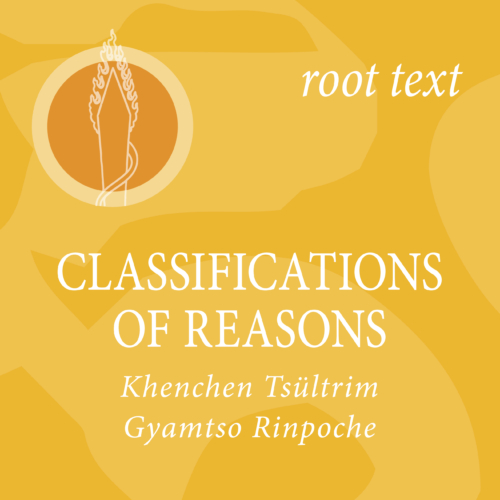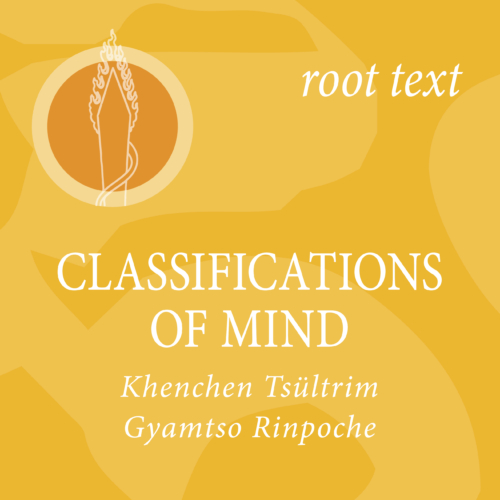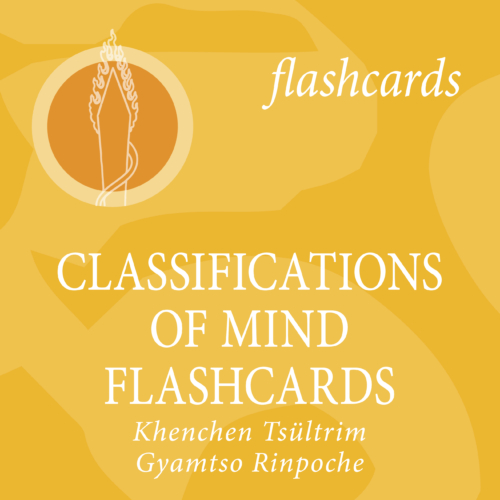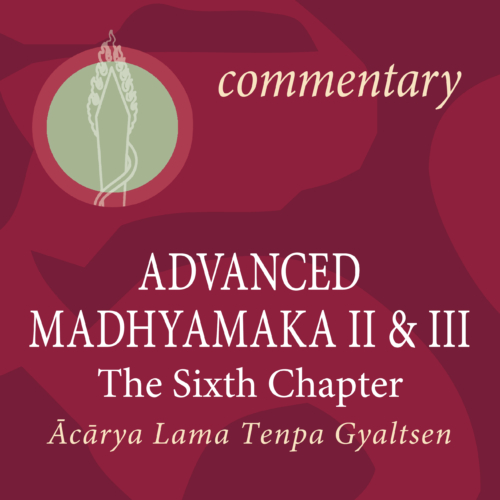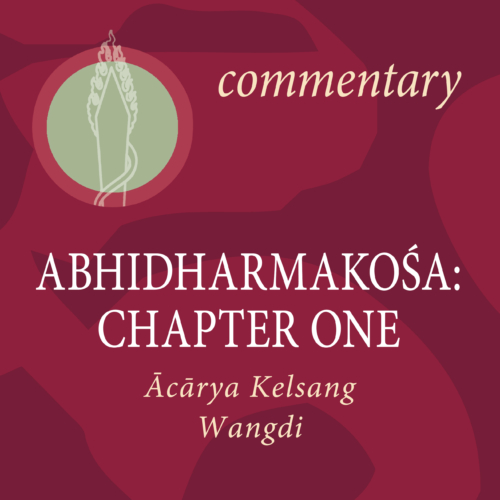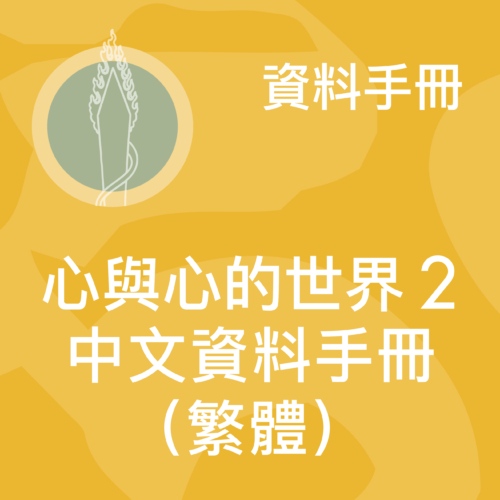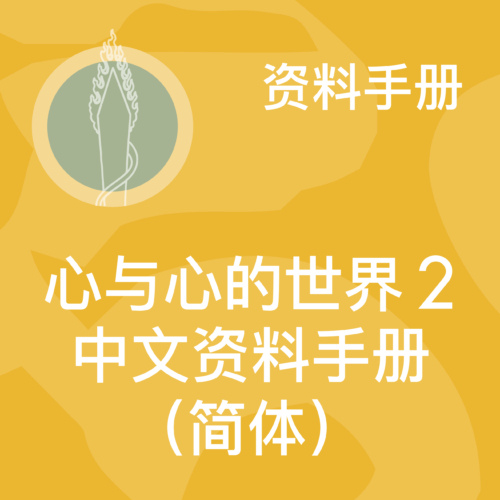-
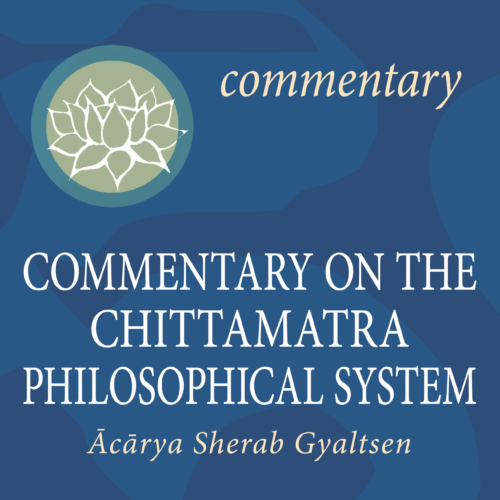
A commentary by Acharya Sherab Gyaltsen
Root verses and commentary on An Exposition Of The Presentation of the Philosophical Systems of the Great Vehicle An Exposition that Reveals the Presentation of the Philosophical Systems of the Chittamatrikas of the Great Vehicle by Dzogchen Ponlop Rinpoche. Translated by Karl Brunnhölzl, Tyler Dewar, and Scott Wellenbach. -
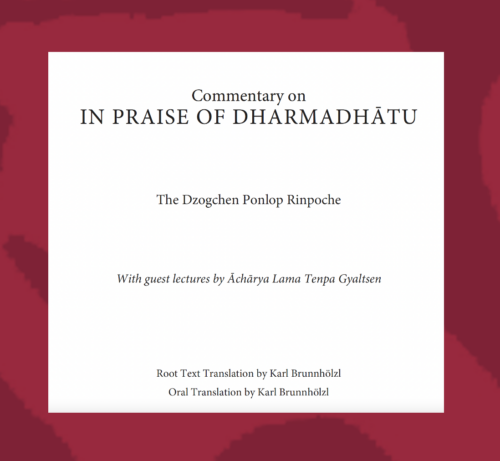 Commentary: This text is published as part of the Nītārtha Institute study program directed by The Dzogchen Ponlop Rinpoche. Commentary on In Praise of Dharmadhātu © 2009 by The Dzogchen Ponlop Rinpoche and Nītārtha international. Root Text: Root stanzas from first edition draft translation of In Praise of Dharmadhātu translated by Karl Brunnhölzl. © 2005 Karl Brunnhölzl and Nītārtha Institute.
Commentary: This text is published as part of the Nītārtha Institute study program directed by The Dzogchen Ponlop Rinpoche. Commentary on In Praise of Dharmadhātu © 2009 by The Dzogchen Ponlop Rinpoche and Nītārtha international. Root Text: Root stanzas from first edition draft translation of In Praise of Dharmadhātu translated by Karl Brunnhölzl. © 2005 Karl Brunnhölzl and Nītārtha Institute. -
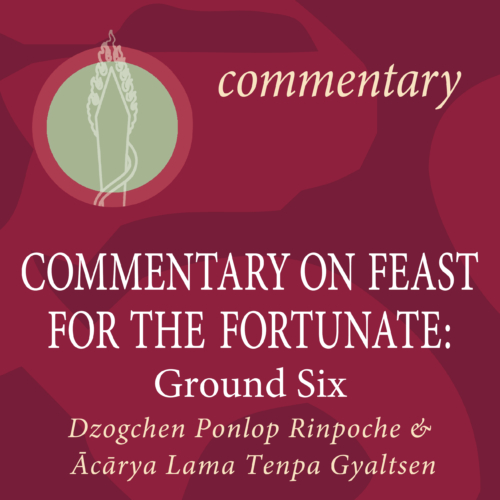 The commentary, Feast for the Fortunate, is the ninth Karmapa’s abridgement of the eighth Karmapa, Mikyö Dorje’s masterpiece, The Chariot of the Takpo Kagyü Siddhas. In it readers will find previously unavailable material on the Karmapa’s Middle Way view and a rare window into a philosophically charged era of Middle Way exposition in Tibetan Buddhism. Wangchuk Dorje’s comprehensive commentary on the Indian master Chandrakirti’s seminal text, the Madhyamakavatara, is marked by eloquent poetry, vigorous and extensive analysis, and heart instructions on breaking through the veils of confusion to independently experience the true nature of things. Includes root text and commentary by the ninth Karmapa Rangjung Dorje, translated by Tyler Dewar.
The commentary, Feast for the Fortunate, is the ninth Karmapa’s abridgement of the eighth Karmapa, Mikyö Dorje’s masterpiece, The Chariot of the Takpo Kagyü Siddhas. In it readers will find previously unavailable material on the Karmapa’s Middle Way view and a rare window into a philosophically charged era of Middle Way exposition in Tibetan Buddhism. Wangchuk Dorje’s comprehensive commentary on the Indian master Chandrakirti’s seminal text, the Madhyamakavatara, is marked by eloquent poetry, vigorous and extensive analysis, and heart instructions on breaking through the veils of confusion to independently experience the true nature of things. Includes root text and commentary by the ninth Karmapa Rangjung Dorje, translated by Tyler Dewar. -
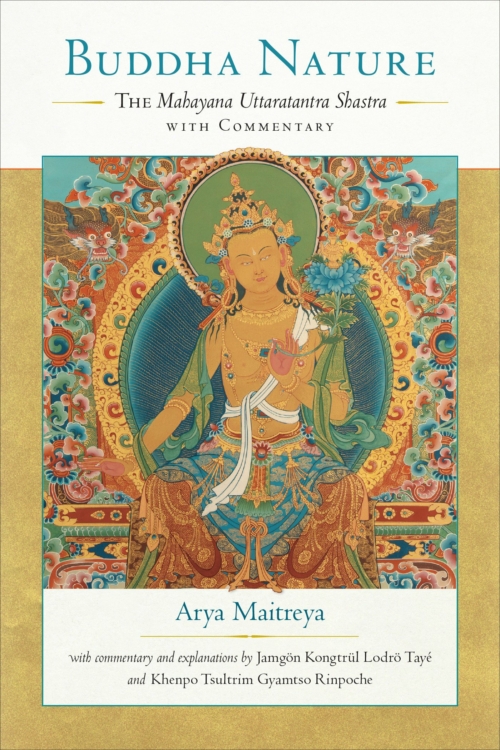
- Also available as an eBook for Apple or Android devices.
- The hardcopy book is shipped from the US. International customers may wish to explore local booksellers or Amazon.com to save on shipping cost.
Buddha Nature: The Mahayana Uttaratantra Shastra with Commentary by Maitreya, Jamgön Kongtrül Lodrö Tayé and Khenpo Tsültrim Gyamtso Rinpoche
Author: Arya Maitreya Commentary: Jamgön Kongtrül Lodrö Tayé and Khenpo Tsültrim Gyamtso Rinpoche Translator: Rosemary Fuchs
All sentient beings, without exception, have buddha nature—the inherent purity and perfection of the mind, untouched by changing mental states. Thus there is neither any reason for conceit nor self-contempt. This is obscured by veils that are removable and do not touch the inherent purity and perfection of the nature of the mind. The Mahayana Uttaratantra Shastra, one of the “Five Treatises” said to have been dictated to Asanga by the Bodhisattva Maitreya, presents the Buddha’s definitive teachings on how we should understand this ground of enlightenment and clarifies the nature and qualities of buddhahood. This seminal text details with great clarity the view that forms the basis for Vajrayana, and especially Mahamudra, practice. -
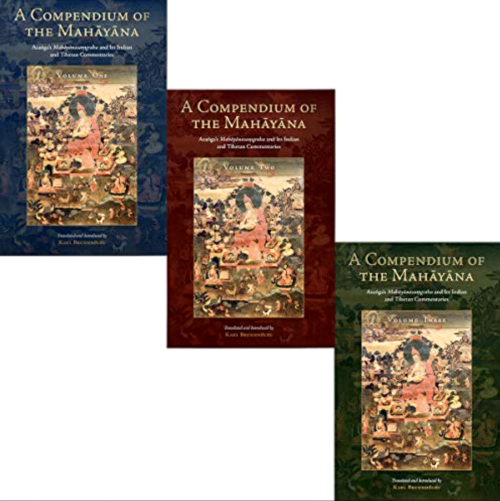
- Also available as an eBook for Apple and Android devices.
- Limited supply.
- The hardcopy book is shipped from the US. International customers may wish to explore local booksellers, Shambala Publications, or Amazon to save on shipping cost.
Translator: Karl Brunnhölzl
Winner of the Khyentse Foundation Prize for Outstanding Translation. The first complete English translation of Asaṅga's Mahāyānasaṃgraha, the most important and comprehensive Indian Yogācāra text, and all its available Indian commentaries. The Mahāyānasaṃgraha, published here with its Indian and Tibetan commentaries in three volumes, presents virtually everything anybody might want to know about the Yogācāra School of mahāyāna Buddhism. It discusses in detail the nature and operation of the eight kinds of consciousness, the often-misunderstood notion of “mind only” (cittamātra), dependent origination, the cultivation of the path and its fruition in terms of the four wisdoms, and the three bodies (kāyas) of a buddha. Volume 1 presents the translation of the Mahāyānasaṃgraha along with a commentary by Vasubandhu. The introduction gives an overview of the text and its Indian and Tibetan commentaries, and explains in detail two crucial elements of the Yogācāra view: the ālaya-consciousness and the afflicted mind (kliṣṭamanas). Volume 2 presents translations of the commentary by Asvabhāva and an anonymous Indian commentary on the first chapter of the text. These translations are supplemented in the endnotes by excerpts from Tibetan commentaries and related passages in other Indian and Chinese Yogācāra works. Volume 3 includes appendices with excerpts from other Indian and Chinese Yogācāra texts and supplementary materials on major Yogācāra topics in the Mahāyānasaṃgraha. -
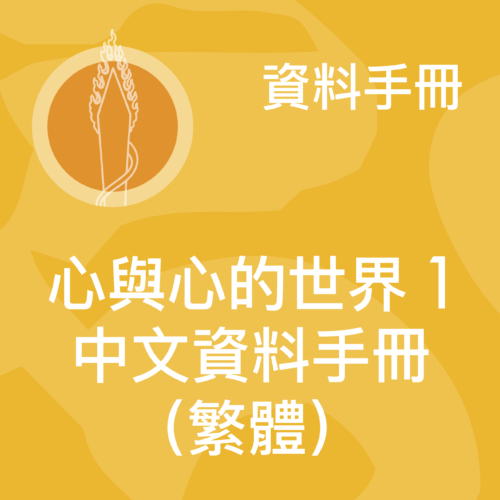 新版《心與心的世界1》和《心與心的世界2》對應英文版的兩本同名手冊,兩本加起來是對堪布仁波切所著的原典《心的科學:邏輯海典心髓》的完整的釋論。新版替代2021中文版的《心的科學:邏輯海典心髓釋論》。新版按照英文版編排,並增加了阿闍黎謝拉布嘉誠的釋論,和每課後的分析式禪修和聞思題。《心與心的世界1》詳細分析作為體驗者的這個心,它如何以如實和不如實的方式感知世界,原典《心的科學:邏輯海典心髓》教導心的分類,法教源泉是陳那和法稱的量論學傳統。要點是區分哪些面向的心如實地感知現象本來的樣子,哪些面向的心是錯亂迷惑的,並束縛我們於輪回。手冊還介紹了基礎乘中有部和經部關於二諦和感知理論的宗義思想。每一課包括課外閱讀、分析式禪修、聞思題。
新版《心與心的世界1》和《心與心的世界2》對應英文版的兩本同名手冊,兩本加起來是對堪布仁波切所著的原典《心的科學:邏輯海典心髓》的完整的釋論。新版替代2021中文版的《心的科學:邏輯海典心髓釋論》。新版按照英文版編排,並增加了阿闍黎謝拉布嘉誠的釋論,和每課後的分析式禪修和聞思題。《心與心的世界1》詳細分析作為體驗者的這個心,它如何以如實和不如實的方式感知世界,原典《心的科學:邏輯海典心髓》教導心的分類,法教源泉是陳那和法稱的量論學傳統。要點是區分哪些面向的心如實地感知現象本來的樣子,哪些面向的心是錯亂迷惑的,並束縛我們於輪回。手冊還介紹了基礎乘中有部和經部關於二諦和感知理論的宗義思想。每一課包括課外閱讀、分析式禪修、聞思題。 -
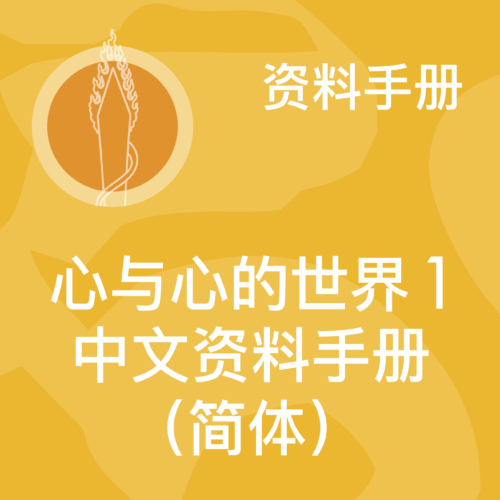 新版《心与心的世界1》和《心与心的世界2》对应英文版的两本同名手册,两本加起来是对堪布仁波切所著的原典《心的科学:逻辑海典心髓》的完整的释论。新版替代2021中文版的《心的科学:逻辑海典心髓释论》。新版按照英文版编排,并增加了阿阇黎谢拉布嘉诚的释论,和每课后的分析式禅修和闻思题。 《心与心的世界1》详细分析作为体验者的这个心,它如何以如实和不如实的方式感知世界,原典《心的科学:逻辑海典心髓》教导心的分类,法教源泉是陈那和法称的量论学传统。要点是区分哪些面向的心如实地感知现象本来的样子,哪些面向的心是错乱迷惑的,并束缚我们于轮回。手册还介绍了基础乘中有部和经部关于二谛和感知理论的宗义思想。每一课包括课外阅读、分析式禅修、闻思题。
新版《心与心的世界1》和《心与心的世界2》对应英文版的两本同名手册,两本加起来是对堪布仁波切所著的原典《心的科学:逻辑海典心髓》的完整的释论。新版替代2021中文版的《心的科学:逻辑海典心髓释论》。新版按照英文版编排,并增加了阿阇黎谢拉布嘉诚的释论,和每课后的分析式禅修和闻思题。 《心与心的世界1》详细分析作为体验者的这个心,它如何以如实和不如实的方式感知世界,原典《心的科学:逻辑海典心髓》教导心的分类,法教源泉是陈那和法称的量论学传统。要点是区分哪些面向的心如实地感知现象本来的样子,哪些面向的心是错乱迷惑的,并束缚我们于轮回。手册还介绍了基础乘中有部和经部关于二谛和感知理论的宗义思想。每一课包括课外阅读、分析式禅修、闻思题。
